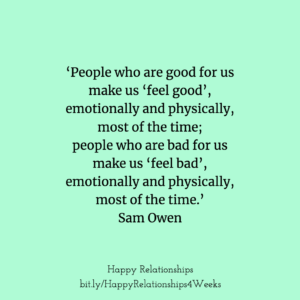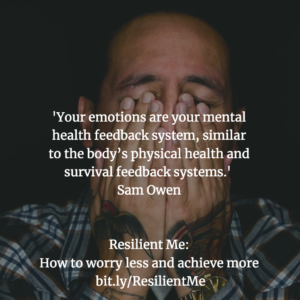
Being authentic feels so good.
It’s exhilarating to boldly tell yourself, ‘I accept myself for who I am. I am comfortable within my own skin.’
No façade, no second-guessing how to behave, no preoccupation with your thoughts. Just being and being present.
Whilst just being your authentic self creates inner calm, being present allows you to enjoy the moment and learn from it, like when you’re on a first date, making a new friend, or resolving an argument with your partner.
When you are being your authentic self, you are also telling yourself and others, ‘Hi! This is me! Let’s work out if we should be in each other’s social network.’
If you don’t click, you’ve simply saved yourself time and protected your well-being from a potentially unhealthy relationship. It’s nothing personal. Nobody gets on with everybody and that’s okay.
Authenticity Research
Research suggests that people sometimes behave inauthentically because of:
(a) a fear of rejection,
(b) to avoid conflict, and
(c) a desire to resolve conflict [1].
However, research also demonstrates a link between being authentic and:
(a) psychological well-being,
(b) higher self-esteem,
(c) better relationship quality, and
(d) a greater tendency to experience positive emotions overall [2].
So for example, whilst a desire to avoid conflict by being inauthentic may feel like a good solution in the short term, in reality it isn’t. It’s the brushing things under the carpet analogy.
All you are really doing is sabotaging your ability to truly resolve that issue and it will thus likely reappear, damaging the relationship in the long-term because of the unresolved tension. Instead of emotional intimacy, you’re creating emotional distance between you and the other person by being inauthentic.
Additionally, you are knocking your own well-being and self-esteem in the meantime because you are telling your brain that you must not be worthy enough to be the real you and be accepted for it.
Plus, being inauthentic to keep the peace, eventually becomes draining.
So then, is being inauthentic really worth it?
It might feel easier in the short term, but it will be harder and often lead to misery in the long-term.
Note, if you are inauthentic and you don’t click with someone you’ve recently met, you’ve already wasted your time by not bringing your real self to the encounter and you’ve hindered your well-being because you’ve chosen to present a false version of yourself and still weren’t ‘accepted’.
Acceptance is a really important word here. When you’re authentic you’re saying you accept yourself. When you’re inauthentic you’re saying you need someone else to accept you in order to accept yourself.
And guess how people feel around people who are behaving inauthentically. Aw-kward! And you know why? Because they can see and hear that you are feeling awkward, which you will be when you’re not being authentic.
Being inauthentic creates anxiety as a result of the internal conflict your brain now has as you second guess yourself, and is communicated non-verbally via your body language, tone of voice and more.
So, let’s look at the perks of being authentic, so that rather than being fearful of being your true self, you’ll boldly want to bring the authentic you to every situation. Remember that being your authentic self doesn’t mean you have to bring all of yourself at all times; you must still tailor your approach to each person and scenario. Just bring a real part of you every time you engage with life.
1. You attract the ‘right’ people into your life and repel the ‘wrong’ ones.
When people know who you are, because you’re being your authentic self, the right people for you, your happiness and your mental health walk into your life. At the same time the ones who are not right for your well-being walk away because they don’t feel aligned with you. This is a good thing. You will do the same when you are being your real self based on whether or not you enjoy the interactions you have with someone.

Being surrounded by people who match your values, motivations and outlook helps you to feel calm and flourish in life. It helps them, too. It’s a win win situation. So by being authentic you make yourself happy and you make those who stay close to you, happy too.
Yes, it’s painful, and even excruciating sometimes, when loved ones leave our life, like an old friend or a long-term partner, but if you or they choose to gravitate away because they are no longer aligned with the real authentic you, then that’s best for both of you.
Sometimes people evolve at different speeds and in different ways no matter how hard you try to evolve together. Sometimes other people make choices out of your control that highlight they are now a mismatch for you and your well-being. That’s life.
Be your authentic self, enjoy the people with whom you have a synergy and embrace the lessons you learn about the ones with whom you don’t. Life is ushering you towards your goals, happiness and life purpose. Don’t let an unpleasant present fool you into becoming stuck and miserable; resiliently embrace the lessons and changes and keep moving forward.
2. You build trust more easily.
People can tell when you’re not being authentic, through your body posture, your facial expressions, your tone of voice and your behaviours.
Think about it. We know when someone is lying because what they are saying and/or doing does not match with what a person would say/do in the given situation.
It’s how criminals such as murderers often arouse suspicion in the first instance. They say they have nothing to do with the murder of their family member but then don’t demonstrate the natural signs of grief either. So police officers, and people watching their TV screens at home, know right away that something about their story is amiss.
And there’s a similar effect when you’re not being your authentic self out of fear of rejection, or a desire to impress or merely fit in. Your verbal communication will be mismatched with your non-verbal communication and your actions, because you’ll be acting rather than just being yourself, and that will show. And because so much of our non-verbal communication is involuntary, the truth will seep through.
Remember that people don’t even need to work out what specifically is amiss about what you are conveying – like, ‘He said he is super confident but his body language with the waiter blatantly shows a lack of confidence’ – they only need to feel that something feels amiss and so will probably distance themselves from you. It may not happen straight away, you might meet a few times, but if you continue being inauthentic on dates, with new work colleagues, with a new friend you met at a party, with your partner’s family…they will eventually struggle to genuinely connect with you and trust you.
So being inauthentic doesn’t work long-term when you’re looking to build a relationship. You might build a rapport, but you won’t build a relationship.
On the flip side…being authentic, as scary as it may feel temporarily, is the only way you will actually build a happy relationship with someone, and once you realise it’s easier than, and not fraught with danger and anxiety like, being inauthentic is, you’ll find being the real you way less stressful and way more fruitful.
3. You say ‘no’ when you need to.
Living life authentically means doing what feels natural and right for who you are deep inside, regardless of ‘norms’, societal expectations, and the advice of well-meaning others.
Sometimes you don’t even need to say ‘no’ to people, you just need to say it to yourself. ‘No, I don’t want to go out today even though everyone suggests I ought to get out more. I know it’s better for me to have some solitude and rest right now.’
Learning to say ‘no’ so that you’re not overloading yourself, and you’re not putting yourself in situations you don’t want to be in, is a form of self-care.
People will make demands on your time all the time if you let them. Text messages here, group conversations there, requests here, expectations there. And you will put unhelpful demands on yourself if you don’t listen to your mind and body.
There is a reason you sometimes feel overwhelmed, tired, low on resilience, weepy, anxious, and so on, and sometimes it’s because you’ve not said ‘no’ enough.
We make and break habits throughout our lifetimes. Create the habit of saying ‘yes’ when it feels right and ‘no’ when it feels right. Your bodily sensations and your overriding thoughts will help signpost you towards ‘I want to do this’ or ‘I don’t want to do this’, or ‘My mind/body needs this’ or ‘My mind/body needs to avoid this.’
Saying ‘no’ because you’re being true to yourself will help your energy levels, your resilience, your health and well-being.

4. You let people know what you need.
When people care for you, they will give you what you need. (Note: if they don’t and they’re hanging around to hurt you, you will notice and eventually get away from them.)
When you’re being authentic, you can tell the people in your life that you need them to be tender with you one day because you’re feeling low. Other times you might need people to be honest with you because you feel they skirt around issues, preventing you from feeling close to one another.
Not only does letting people know what you do need help you to be happier and healthier and form a better relationship with them, it also helps you to work out whether those people truly care for you and deserve a place in your life.
Those who pass with flying colours should remain in your inner circle and you’ll want to nurture those relationships. Appreciate them and let them know you do. They are priceless. Look after them. Those who time and time again fail to give you what you need and have asked for, need to be distanced to either your outer circle or asked to leave altogether. In Happy Relationships I refer to this as ‘pause or prune’.
When you let people know what you need, you learn whether you need them closer or further away.
5. You do what makes you happy and fulfilled.
An inauthentic life is where you’re just existing, often trying not to hurt others or make them uncomfortable but instead you’re just hurting yourself.
When you live life authentically, you start with you and work outwards, rather than starting with the world and working inwards. You hang out where the environment fits with you. You surround yourself with people who match your inner being. You engage in pursuits that fulfil you. You have conversations that make you feel alive.
Always build your relationships and career around your personality, not the other way around.
When you live authentically, work and play are both, for the most part, moulded around who you are at your core, and that leads to happiness and fulfilment.
Being Authentic Always Leads To Happiness In The End
When you live authentically, you might experience some bumps on the road, but they are just teaching you life lessons about who and what should be a part of your life.
As you keep on being authentic, you’ll come to signposts, some of which will take you to destinations you’ve always dreamed of.
References
1. Lopez, F. G., & Rice, K. G. (2006). Preliminary development and validation of a measure of relationship authenticity. Journal of Counseling Psychology, 53(3), 362–371. https://doi.org/10.1037/0022-0167.53.3.362
2. Wilt, J. A., Thomas, S., & McAdams, D. P. (2019). Authenticity and inauthenticity in narrative identity. Heliyon, 5(7), e02178. https://doi.org/10.1016/j.heliyon.2019.e02178













